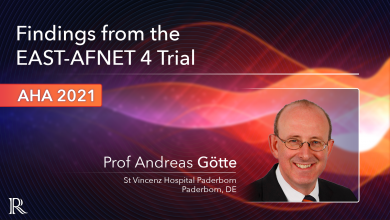Search results
Author(s):
Giulio Conte
,
Ulrich Schotten
,
Angelo Auricchio
Added:
3 years ago
The Risk of Atrial Arrhythmias in Inherited Primary Arrhythmia Syndromes
The inherited primary arrhythmia syndromes (IPAS) are a heterogeneous group of diseases caused by mutations in genes encoding for cardiac ion channels. People affected by one of these inherited diseases have no overt structural cardiac abnormalities but are at higher risk of sudden cardiac death due to the occurrence of…
View more
Author(s):
A John Camm
,
Bernard J Gersh
,
Demosthenes G Katritsis
Added:
3 years ago
Inherited arrhythmias comprise a group of disorders with inherited susceptibility to arrhythmias and conduction disturbances due to mutations in genes mainly encoding the Na+, and K+ channels, and other arrhythmogenic mechanisms such as those linked to Ca++ transport (Table 1).1 The majority of heritable cardiomyopathies and channelopathies are associated with disease-susceptibility genes…
View more
Author(s):
Giulio Conte
,
Maria Luce Caputo
,
François Regoli
,
et al
Added:
3 years ago
General understanding of early repolarisation (ER) has dramatically changed in the last decade. For several years, ER has been considered a benign electrocardiographic (ECG) finding with high prevalence in the general population. Recently different studies have challenged this view and showed a significant association with life-threatening arrhythmias.1–5
In 2008 Haïssaguerre et al. first…
View more
Michael Fu
Job title: Professor, Principal Investigator, Senior Consultant Physician/Cardiologist
Author
Long QT Syndrome Modelling
Author(s):
Luca Sala
,
Massimiliano Gnecchi
,
Peter J Schwartz
Added:
3 years ago
Article
Author(s):
Frédéric Schnell
,
Nathalie Behar
,
François Carré
Added:
3 years ago
Congenital long QT syndrome (LQTS) is an inherited cardiac ion channelopathy characterised by a variable degree of QT interval prolongation on ECG and an increased susceptibility to life-threatening ventricular arrhythmias (torsades de pointes and ventricular fibrillation) in the absence of morphological cardiac disease.
LQTS is estimated to affect one in 2,000 individuals.1 It is usually…
View more
Author(s):
Cynthia A James
Added:
3 years ago
Arrhythmogenic right ventricular dysplasia/cardiomyopathy (ARVD/C) is a rare heritable cardiomyopathy characterised by fibro-fatty replacement of the myocardium, which predisposes patients to frequent lifethreatening ventricular arrhythmias and slowly progressive ventricular dysfunction.1,2 Structural involvement of the right ventricle (RV) generally predominates,3,4 although left dominant forms…
View more
Author(s):
Serge Sicouri
,
Charles Antzelevitch
Added:
3 years ago
The link between sudden unexplained death in individuals with mental health problems who are administered antipsychotic drugs has been recognised for over a century.1 A clear relationship has emerged over the past 25 years between antipsychotic drugs, prolongation of the QT interval of the ECG, atypical polymorphic tachycardia known as torsade de pointes (TdP) and sudden cardiac death (SCD). A…
View more
Author(s):
Philippe Charron
,
Eloisa Arbustini
,
Gisèle Bonne
Added:
3 years ago
Most mutations of the LMNA gene affect the heart, causing a dilated cardiomyopathy, ususally with conduction defect and ventricular arrhythmia, with or without skeletal muscle involvement. Although a relatively rare disease, cardiologists should be aware of laminopathies (diseases caused by LMNA gene mutations) because of the particularly aggressive course compared with most other…
View more
Author(s):
Andreas Goette
Added:
2 years ago
In this short video interview, Prof Andreas Goette (St Vincenz Hospital Paderborn, Paderborn, DE) discusses the findings from the the EAST-AFNET 4 Trial. The trial investigated whether rhythm control therapy delivered within one year after AF diagnosis improves outcomes. The trial, presented at AHA 21, demonstrated that clinical benefit of early rhythm control was consistent in AF patterns.
…
View more












